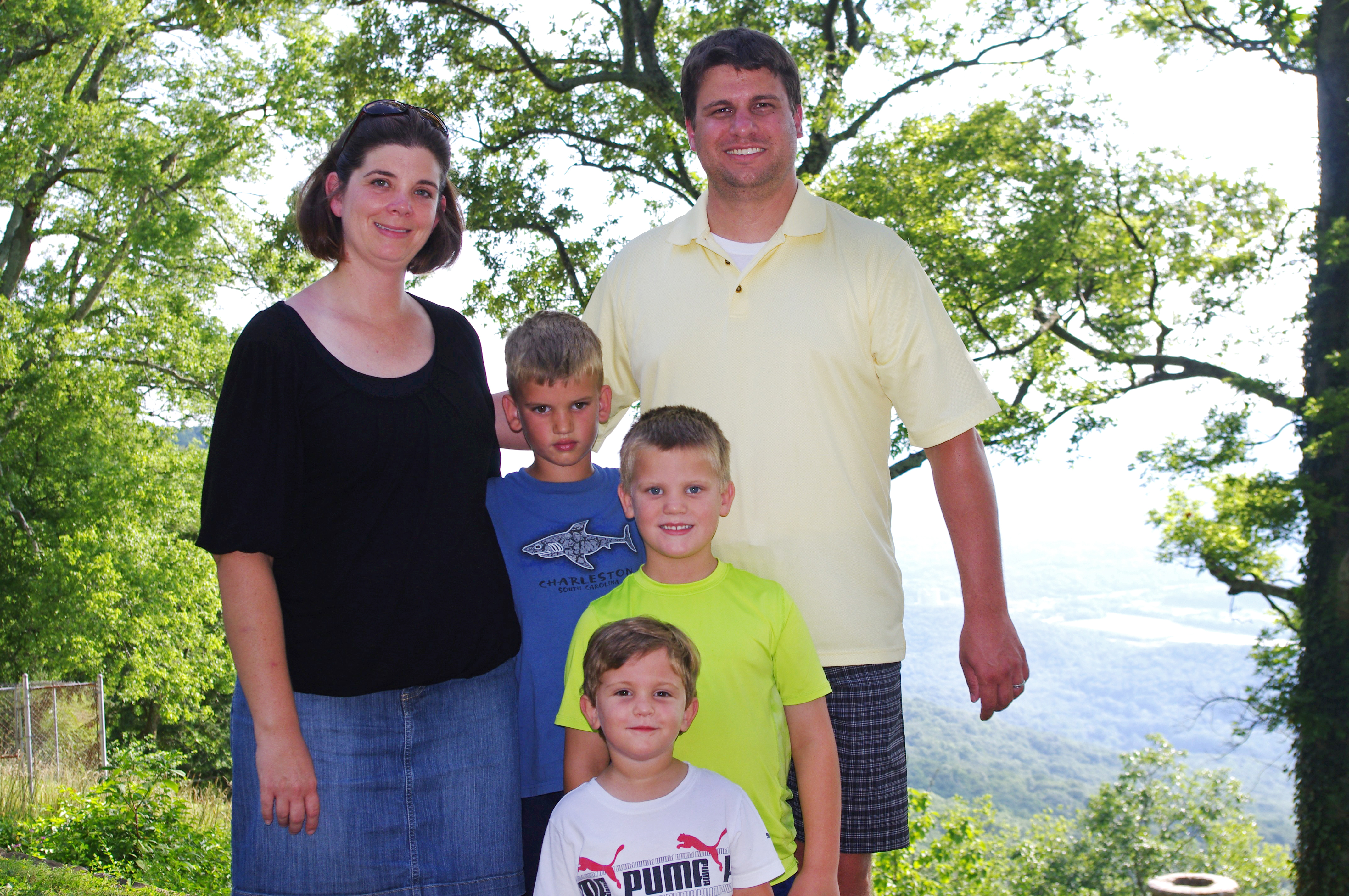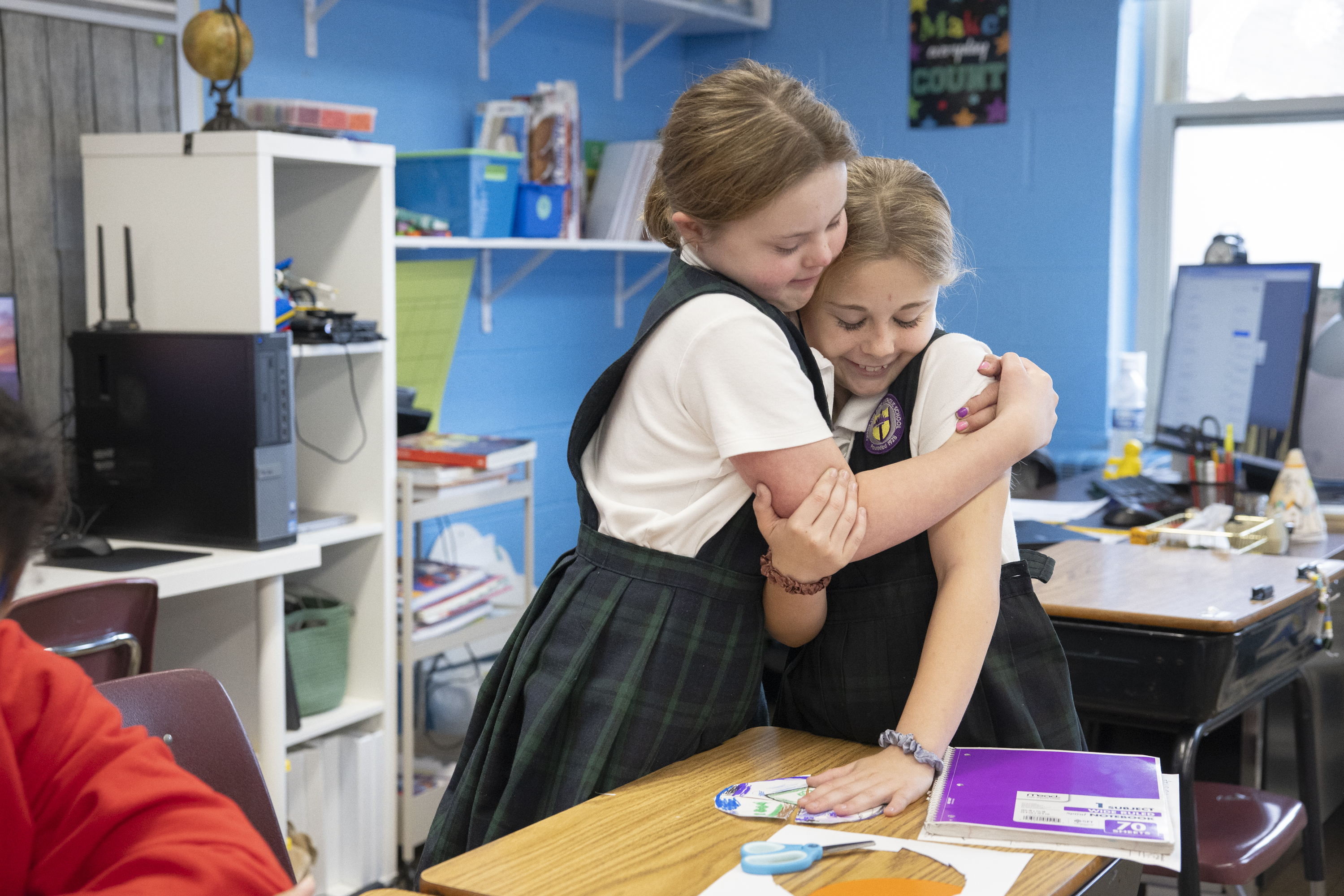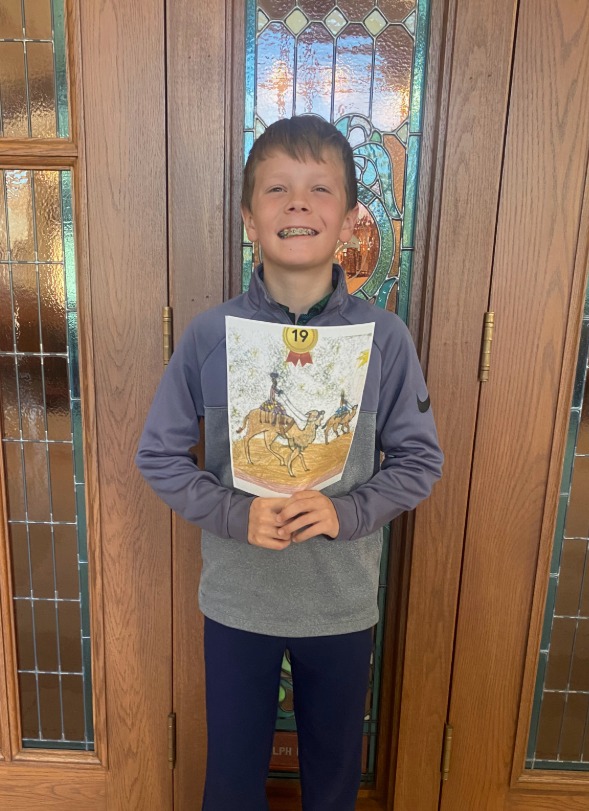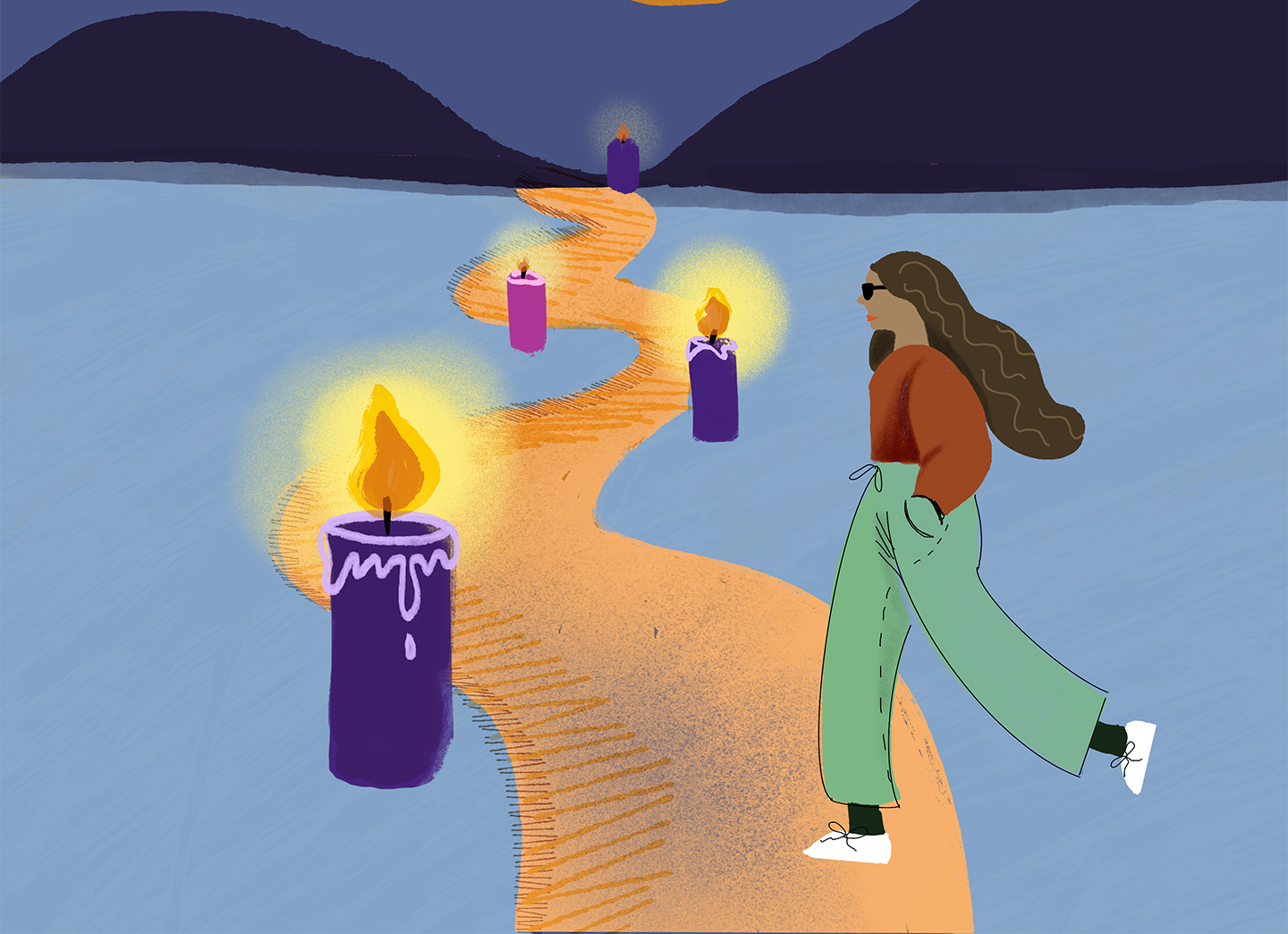Immigrants share personal experiences of fear, faith with Archbishop Rozanski
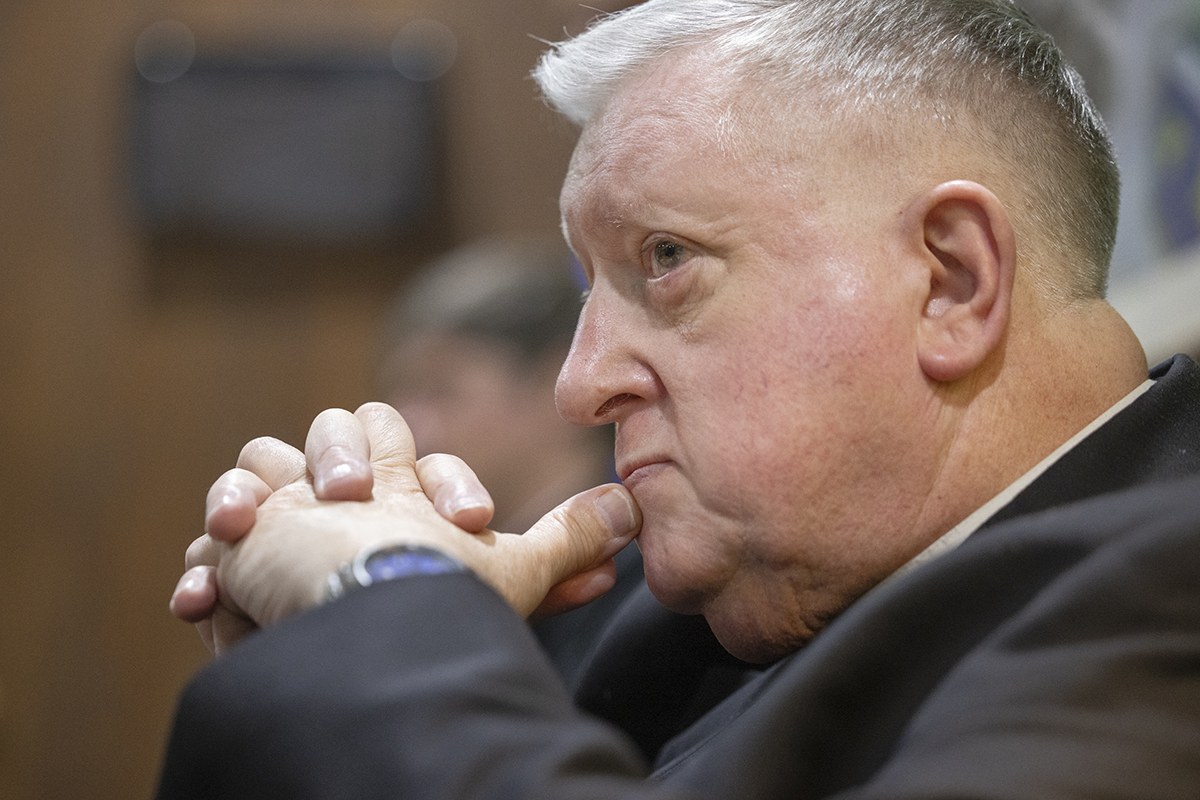
The archbishop met with about 20 people to listen to their stories, offer support
On a recent Tuesday evening, Archbishop Mitchell T. Rozanski met with about 20 immigrants from parishes in the archdiocese to listen to their stories of migration and their experiences in the current climate.
The overwhelming theme was fear.
A young man who said he was from Honduras shared that when he was 16, his family was going through hardship and poverty. His parents and brothers migrated to the U.S., but he was left behind with other relatives. He eventually made the journey himself.
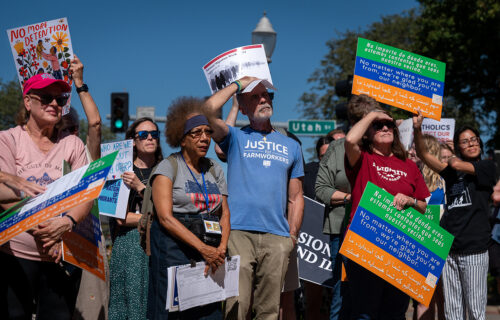
Participants expressed support for immigrants and migrants during a prayer vigil on the steps of St. Pius V Church in St. Louis marking the World Day of Migrants and Refugees Oct. 5. Participants from across the Archdiocese of St. Louis gathered at the church in the South Grand neighborhood of St. Louis with the theme “Prayer of Solidarity with Migrants, Missionaries of Hope.”
After ending up in St. Louis alone, he found help with shelter and food through a parish community, which also connected him with a lawyer to begin the asylum process. He now has a social security card and a work permit but said he still doesn’t feel secure.
“Even though I do good things, try to stay good, I still feel fear. I don’t feel safe in the current situation, even after doing everything good — they don’t care about that,” he said through a translator. “All my effort can someday just be wiped out.”
One woman said she was from Mexico and came to the United States at age 22. She has been here for 37 years but has been unsuccessful in legalizing her residency status. Because of this, when her mother passed away last year, she couldn’t go back to see her or attend the funeral.
A married couple said they came to the U.S. from Colombia about four years ago, seeking political asylum after experiencing violence in their country. Their cases have been moving through the system. This year, check-ins have increased; he’s been called in to the Immigration and Customs Enforcement (ICE) office seven times since January, he said. “I’m scared because of what is going on, where they are picking people up from court,” he said through a translator.
His asylum case court date is scheduled for next June. He encouraged the others to stay close to God and keep the faith as they move through these difficult situations. “Let’s not stop praying, and let’s ask God for help. He will listen to our prayers, and He will guide us through it,” he said.
Several people told the archbishop they have been making plans with their children about what to do if they, the parents, are suddenly detained. Many spoke of their fear of driving, including taking their kids to school. While most of the immigrants present were from Latin America, a Palestinian family who arrived around the start of the Israel-Hamas war and a Kenyan woman who had been a victim of human trafficking also shared their stories.
A woman who attends a St. Louis parish said she doesn’t drive but has always gotten rides to Mass and other church activities. One Sunday, her daughter told her she was too frightened to drive her that day. Determined not to miss Mass, the woman called an Uber.
As they were heading toward the church, she saw flashing lights and an ICE officer stopping cars at a checkpoint. “I called my daughter and said that maybe she was not going to see me again, but to stay calm,” she said through a translator.
When it was almost their turn at the checkpoint, the officer started waving all the cars through without stopping them. She had been praying the whole time. “All the good and bad, I offer to God,” she said.
One woman introduced herself as a native-born U.S. citizen who lived in Argentina with her parents for a time. Even though she is a U.S. citizen, she has started to consider leaving the country because she is tired of living in constant fear, she said.
“I’m afraid when I’m driving, because I’m brown and I have an accent,” she said. “I’m afraid for my daughter when I’m taking her to school.”
It especially “breaks my heart” when Catholics take part in hateful rhetoric about immigrants, she said.
“We need the body of Christ to understand that we are one body, in reality. It’s not science fiction, it’s not just a story, it’s true. And when one part of the body hurts, the whole body hurts,” she said.
“We need our pastors, more than ever, to speak up for those who don’t have a voice,” she continued. “I know the devil uses ignorance many times to create hate, but that’s why we need that voice to teach our brothers and sisters that their neighbor is us.”
Archbishop Rozanski listened attentively to the stories for about two hours until all present had a chance to speak.
“We need to bring to all of the body of Christ the struggles that are happening, the pain that is being caused, and the fear that is only from the devil,” he told those gathered at the end of the evening. “What I see in our country today is a motivation of fear, and that fear only drives us apart. It contributes to really the disintegration of our nation, and it blinds us to who our brothers and sisters really are.”
Archbishop Rozanski quoted St. John Paul II’s frequent exhortation to “be not afraid” and encouraged all to rely on his intercession. Amid the fear and so much hateful rhetoric, the Church must show the country that there is another way — a way of unity and compassion.
“Your stories this evening have affirmed my belief of how much work the Church has to do in building up the Body of Christ here in the Archdiocese of St. Louis and in our nation. I thank you for the courage you have, for what you endure each day, and how, through even that fear, you seek to build up the Church, the body of Christ, and our country,” the archbishop said. “Know that I stand with you and will continue working — sometimes behind the scenes, sometimes up front — but know that we will continue to work for the betterment of all.”
In line with the Gospel
In an interview after the listening session, Archbishop Rozanski said that as a spiritual father, hearing about his people’s experiences was “heart-wrenching.”
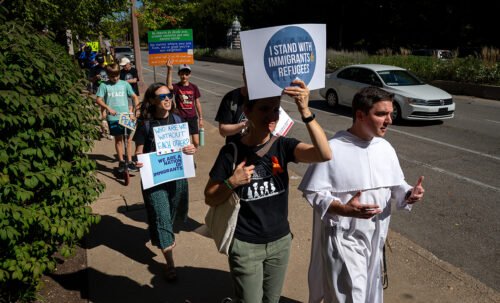
Emily (Schlitz) Sides, center, and Brother Dominick Jean, OP, talked while on a pilgrimage from St. Margaret of Scotland Church to St. Pius V Church.
“What was very important to me is to realize that there are many frightened people in our nation, but the Church is here to care for them, and so I wanted, in my presence with them and listening to their stories, to let them know of the Church’s concern, love and embracing of them,” he said. “…Hearing those stories really just touches my heart, but also affirms for me that the Church needs to be where people are hurting.”
Many shared stories of getting involved in parish life and working hard to contribute to their communities, he noted. Often, people who haven’t had the same experiences can get so lost in politics that they have a difficult time embracing who our brothers and sisters really are, he added.
“It’s that jump to the realization that the Church is here to take care of people, totally outside of politics,” he said.
He encouraged everyone in the archdiocese to take some time to learn about the situations that cause people to leave their countries and the sacrifices immigrants make to come here. The United States Conference of Catholic Bishops’ website has many good educational materials on the topic, he said.
Then, “I think it’s being able to look at the whole picture of immigration here in the United States to realize that our system needs fixing, and to help raise our voices to those who have political power to start addressing this very difficult issue, but an issue that really needs to be addressed,” he said.
The way to truly build up the body of Christ in these times starts with the realization that Jesus’ call in the Gospel is for all of us, Archbishop Rozanski said.
“We’re all called to be brothers and sisters in the Lord. That’s the very basis of who we are as Catholics. And also to recognize that there are those who are hurting among us in the immigrant community, and they are part of the body of Christ, and we are all part of the body of Christ,” he said. “So whatever way in which we can seek to alleviate their pain and suffering, to reach out to them, to make them feel welcome, is really a step in the positive direction that puts us right in line with the Gospel.”
>> Learn more
Read more about Catholic social teaching on immigration and the U.S. bishops’ Justice for Immigrants campaign at usccb.org/committees/migration/immigration
The archbishop met with about 20 people to listen to their stories, offer support
Subscribe to Read All St. Louis Review Stories
All readers receive 5 stories to read free per month. After that, readers will need to be logged in.
If you are currently receive the St. Louis Review at your home or office, please send your name and address (and subscriber id if you know it) to subscriptions@stlouisreview.com to get your login information.
If you are not currently a subscriber to the St. Louis Review, please contact subscriptions@stlouisreview.com for information on how to subscribe.

